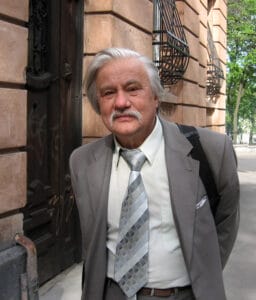Born in Khodoriv, western Ukraine, Kalynets’ parents strongly favored Ukrainian cultural traditions, and kept banned literature written in Ukrainian in the home — where young Ihor read it. As a child, he also witnessed mass deportations of Ukrainian citizens by the Soviets. Still, he managed to go to school, and graduated from Lviv University in 1961, and was a writer.
Mostly writing modernist poetry, Kalynet’s first book was published in 1966 — and immediately banned. Later works were smuggled out of the country to be published in the west. His work glorified Ukrainian culture, including his country’s ancient pagan and early Christian heritage. While his work didn’t contain overt anti-Soviet criticism, he dedicated his poems to Ukrainian-born cultural figures such as filmmaker Alexander Dovzhenko, composer Stanislav Liudkevych, and writer Taras Shevchenko, rather than Soviet leaders, as others had done to appease the totalitarian authorities. By 1971, the Communist Party of Ukraine denounced Kalynets’ writings as “reprehensible,” and indicted him for several made-up “anti-Soviet” crimes — that he “issues a veiled appeal to struggle against the Soviet government”, “calls for a revival of the Uniate Church”, “covertly presents the idea that the Ukrainian people are oppressed by the Soviet government”, and “articulates a nationalist ideology, as well as nostalgia for the past and for an independent state.”

Kalynets was arrested in August 1972, tried in a secret court, convicted, and sentenced to 6 years of hard labor followed by 3 years in Siberian exile. His wife, Iryna, who was also a writer and dissident, got similar treatment; she died in 2012. While in prison, Kalynets was hardly cowed: he worked in the resistance movement, was involved with hunger strikes, wrote appeals, and wrote chronicles of the two work camps where he was held in the Ural mountains. Once released in 1981, he worked in the Lviv Academy of Sciences, published children’s books, and edited magazines.
Once Ukraine won its independence in 1991, Kalynets went back to writing poetry, this time to be published at home. In 1992, Kalynets was awarded the Shevchenko National Prize, the highest state prize of Ukraine for works of culture and arts, named for the writer Kalynets had dedicated one of his works to. In 1997 he was awarded the Antonovych Prize, given by the Omelian and Tetiana Antonovych Foundation for literary works written in Ukrainian, or for research in Ukrainian studies; it came with a US$10,000 honorarium. And in 2009, he was made a Member of the Order of Liberty, which honors Ukrainians for strengthening the sovereignty and independence of Ukraine, consolidating Ukrainian society, developing democracy, advancing socioeconomic and political reforms, and advocating for constitutional rights and liberties. Kalynets was “the voice of Ukrainian dignity in the darkest times,” said Lviv Mayor Andriy Sadovyi, upon his death. Ihor Myronovych Kalynets died on June 28, 11 days before he would have turned 87.
